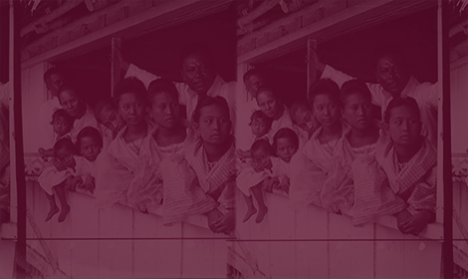Sea, Land, Air: Migration and LaborCriticism<i>Scholar and Feminist Online</i> Summer 2008.Courtesy of <a href="http://sfonline.barnard.edu/immigration/" target="_blank">Barnard Center for Research on Women</a> and Martin Manalansan I.V.</p>ScholarQueering the Chain of Care Paradigm
Martin F. Manalansan IV
In this paper, I briefly explore the increasingly heteronormative framing of gendered global migration in recent research works in the area.[1] The study of the so-called "feminization" of global migration is best exemplified in the chain of care migration paradigm. This paradigm, established by social scientists, focuses on the movement of Third World female migrants to the First World as domestic workers to take care of children and the elderly. "Chain of care" pivots around a disturbing process of gendering that is based on the deployment of normative conceptions of care, love, and other emotions.
But before I launch into my argument, I want to briefly acknowledge the location of gender in relation to research on global migration. Gender, in particular, has only been recently given proper attention in migration studies. I participated in a much-needed critical assessment of the works on gender and migration to date in a Social Science Research Council sponsored working group together with anthropologist Patricia Pessar, historian Donna Gabaccia, sociologist Katharine Donato and political scientist Jennifer Holdaway. In our co-edited special issue of the International Migration Review[2], we explored how the various social science disciplines were engaging with the gender question in migration. Our findings show that some disciplines such as anthropology, history and sociology have been at the forefront of engaging gender in migration studies, but others, such as economics, were rather slow to engage with this issue. In their trenchant review and agenda-setting essay on ethnography-based scholarship in this volume, anthropologists Patricia Pessar and Sarah Mahler[3] put forward a very productive view of gender as "relational," "contextualized" and "multi-scalar." They both caution, echoing a previous review of the field by Hodagneu Sotelo[4], that in the process of "writing in" women's experiences in migration, gender not be equated with "woman."
It would seem that this very simple yet vital precaution is not being heeded by researchers conducting research on global domestic labor as they proceed to examine the emotional underpinnings of the work involved in this industry. This focus on emotional labor is part of the "affective turn" (as one recently published book terms it) in both the humanities and social sciences that has been both a source of concern and celebration. It is undeniable that a focus on feelings and emotions can be rewarding particularly as it may reveal structures of power. Many scholars agree that gender and emotions are a crucial tandem that enables the productive analysis and understanding of contemporary social arrangements, particularly global labor flows.
As I have mentioned above, my own specific preoccupation on this matter has been about recent research on the global movement of Third World women to the First World to work as nannies and maids as contextualized by the formation of the "chain of care." This conceptual framework is constituted by structured relationships formed through the flow and displacement of maternal affect. My purpose here is not to disparage notable works on domestics; they all have made important interventions. Rather, I want to initiate a critical dialogue around the politics of affect that may push the research into a more creative and expansive stage.
In the book Global Woman, the editors Barbara Ehrenreich and Arlie Russell Hochschild[5] point to the emerging and unequal flow of affect between the Third World and First World. The "chain of care" is a linear concatenation of bodies and feelings propelled by the migration of Third World women to the First World. Third World women are torn away from their biological families and forced to leave their children in the care of poorer women in the homeland, to take care of the progeny of modern working mothers of the first world. Therefore, the authors suggest, Third World women take on the burden of First World women's liberation from domesticity by providing emotional and physical labor needed at the homes of the latter. This situation, they argue, causes a "care drain" and a "global heart transplant," where the global domestic labor market siphons off affective energies away from the poor countries of the world as Third World women fracture households and leave families motherless and wifeless. Therefore, this "chain" is forged primarily through affective links constituted by biologically reproducing women of the First and Third Worlds and the displacement of their affective and physical labor from their biological families. The glue that keeps this chain together in a linear fashion is the heterosexualized bodies of both First and Third women while the fuel for the global dispersal of migratory domestic labor is normative maternal love. Therefore, the chain of care framework foregrounds the pathos of dislocated biological motherhood.
However, as a feminist and queer studies scholar, my intent is to unsettle the seemingly logical arrangement and natural symmetry of this rather static formula that reads as follows: domestic = family = heterosexual woman = care and love. My alternative queer reading revolves around several questions: What are the consequences of this framework for understanding gender as a relational process and for illuminating women's experiences in global migration? What happens to this linear arrangement of affect and travel when reproduction is not the pivot for the mobilization of gender labor migration? What happens if we de-center biological motherhood and its naturalized linkage to "caring"? What if we include such queer creatures as gay men, single and married women with no "maternal instinct," and transgendered persons into the mix? How can we queer this particular migratory diaspora without dismissing the struggles of some of its constituents?
At the outset, I want to emphasize that I am not denying the existence of sexism, patriarchy, and violence that Third World women face in their home countries. I aim to explore alternative narratives that would dispel the rather hasty, and I would suggest, quite dangerous, gendering of global labor migration in recent social science migration research.
The neat symmetry of the "chain of care" paradigm lends itself to a precarious linearity that unwittingly constitutes narratives of modernist development founded on imperial designs and desires. Hochschild, in her attempt to find an ethical solution to the drama and dilemma of the absent mother and wife, proposes an ideological makeover, or a father re-education program, for Third World men. Her ideal models for such a re-education are Norwegian men who take parental leave and participate in domestic affairs more than their Third World counterparts.[6] This tutelary solution is no less imperial than the "emotional imperialism" that Hochschild and Ehrenreich talk about when affective energies are "drained" from the Third World and transported to the First World. Two things are clear from these formulations: first, there is a total and universal subjugation of Third World women in the domestic sphere and an absolute disinvestment of Third World men from care work; second, affect is a cumulative essence that can be neatly packaged and transferred.
In order to move forward from these problematic formulations, I argue that the narratives and experiences of women and men (gay, lesbian, bisexual or heterosexual) as well as transgendered people (both male-to-female and female-to-male) among migrant domestic workers disrupt the neat synchronicity of the "chain of care." To this end, I find inspiration in recent works from such anthropologists as Jennifer Hirsch, Mark Padilla, Denise Brennan, and Nicole Constable[7], among others, as well as recent cultural productions such as the documentary film, Paper Dolls.
The film Paper Dolls provides an alternative framework to situate migrant care work and gender. Paper Dolls is a documentary produced in Israel that chronicles the travails of gay Filipino men and M-F transgender domestic care workers who work as unskilled "health aides" and whose charges are elderly Orthodox Jewish men. They are also part of a female impersonation or drag performance group called Paper Dolls. The director, Tomer Heymann, follows these queers as they contend with the vicissitudes of domesticity, gender, and migration. He tracks their everyday struggles with language, drag performances, the police and immigration authorities, racism, and caring for a largely infirm group of Orthodox Jewish elderly men.
At first glance, many of these "domestic" situations are not the recognizable and stereotypical "feminine" variety that showcase the circulation of global love and compassion. One transgender care worker named Sally develops a familial and intimate relationship with her client. When asked if her client now considered her as a son, Sally said that she felt like a daughter to him. In several scenes, the old man teaches Sally how to read poetry in Hebrew. While he admits that he does not understand Sally's "gender situation," he nevertheless gives her a skirt as a gift. Such moments of intimacy and caring illustrate that the messy conjunctions of gender and care work do not clearly follow normative lines.
At the same time, Sally's situation seems to be the exception to the rule. Many people I have talked to after viewing the film remarked on how the gay Filipino care workers accomplished their work tasks with a kind of cold efficiency. Jan, one of the Filipino care providers, goes about his daily routines with an efficient though less intimate manner than Sally. Many viewers have remarked how Jan seemed to be less invested in his work since he does not seem to "love" his job. It is only when he dresses up in drag in the dimly lit corridors of his client's apartment that he "comes alive." Viewers asserted that most of the care workers in the film were like Jan, just going through the paces and enlivening while in the drag performances. In many cases, viewers asserted that these gay domestic laborers, unlike Sally, did not really "care" and that the work was less about emotion and more about sweating it out in a mechanical fashion.
Does this mean that these gay men and transgendered women are devoid of "feelings"? Are these care workers inauthentic because as biological men they are not "equipped" to fulfill the "natural" womanly role of caring? Or is it more accurate to say that their feelings are less grounded in normative domesticity and filial attachments?
I would argue that the film viewers I talked to are not the only ones who seem to suggest the inadequacy of non-normative female (non-mothers, single, transgendered, or mothers without "maternal instincts") and male subjects in this context. I submit that Ehrenreich and Hochschild in Global Woman (as well as scholars such as Michael Hardt and Antonio Negri who wrote about affective labor[8]) have calcified and naturalized the link between female domesticity and care work. Finally, I suggest that Global Woman, and other works, unwittingly echo the universalization of "woman" espoused by an earlier wave or strand of feminism that has long been critiqued. However, this time, it is a universality inscribed onto the Third World woman's brown body.
I strongly believe that we need to expand our idea of "care work." The Paper Doll queers are indeed performing care labor beyond the routine of feeding, washing and moving their infirm clients. In their drag shows, I would argue, they are performing a "care of the self"[9] as Foucault terms it. In "care of the self," Foucault argues for the ways in which the subject "cultivates" or more appropriately "labors" to constitute a sense of self through quotidian activities. This process of self-cultivation is in many ways disciplined and constrained, while at the same time it is also a space where the subject may feel a sense of exuberant freedom. It is this self that is presented to a public that scrutinizes, rewards or punishes accordingly, so subjects often have to mediate, veil or dissimulate these glimpses of selfhood. Also, part of this process of self-making involves the search for pleasure. This goes back to Jan and the other "non-caring Paper Dolls" who, within their everyday miseries and struggles, are able to establish mostly fleeting, yet oftentimes fulfilling forms of sociality (with each other and with various audiences) and moments of pleasure. These forms of sociality are in fact imbued with affective energies that at once "authentic" and dissimulated. Members of the Paper Dolls troupe find pleasure in dressing up and performing in front of audiences, and they also find pleasure and solace in being together as a group. In other words, through their drag performances and their off-stage activities (including group sleepovers in cramped quarters) members of the Paper Dolls troupe unravel the false binary of true/authentic and fake/dissimulated feelings.
The film reminds me of the Caribbean informants in the ethnographies of Denise Brennan and Mark Padilla who focused on the workings of tourism and sex work in the Dominican Republic. These ethnographies showcase the conflicting and contradictory aspects of gender and labor particularly in the performance of labor, gender roles, and feelings. Although not necessarily about domestic care work, the sex workers in these ethnographies refuse to bracket emotions from the labor of "prostitution." The ethnographies illustrate how in many ways sex work is a kind of care work, where the flow of affect explicitly dislodges the domestic from its moorings within familial and reproductive imperatives. In What's Love Got to Do with It?, Denise Brennan describes how Dominican women catering to the desires of Western men "perform" love and navigate the rather murky waters of money, emotions and pleasure. These narratives suggest other ways of emotional "directionality" that depart from normative ones, which often hinge on pure hence authentic expressions of love and care.
My own experiences in AIDS prevention education in the nineties extend these important ethnographic illustrations. As a person in charge of education programs for Asian Americans in New York City, I supervised an outreach program for Asian domestic workers. One day, one of the outreach workers, herself a domestic worker for a wealthy Upper East Side family, told me that she was going to a nightclub in the Lower East Side of Manhattan to have friendly information "chats" with other Filipino and South Asian domestics. I asked her why she would need to go to a club, when these women were married mothers in their respective homelands, and I argued that parks, churches, ethnic stores and community centers were the typical outreach sites for this population. She looked at me and a bit patronizingly said, "Martin, some of us may be married and have children, but we have other lives to lead."
She told me that the domestics she worked with are people who too have their own search for pleasure and fulfillment beyond the confines of the nursery, kitchen and the marital bedroom. Some of the female domestics found solace with other women, while others found it with foreign men. At the same time, it was not just about sex or companionship, as some women found self-fulfillment in religion and civic work. The outreach worker emphasized that the lives of Filipina domestics in New York City are more complicated that being purveyors of a particular form of "care" or laborers of "home-based" emotions, or that they are constantly providing "authentic," "true" or "heartfelt" care.
Here, we again encounter the rather messy issue of dissimulation and authenticity that is often read into people who fall outside the normative conceptions of maternal care. These New York City domestics are very much like Jan and other members of the Paper Dolls troupe and the Dominican sex workers who seemed to feign interest, desire and even love. Being ungrounded in normative domesticities, these subjects provide important lessons in the complicated and muddled arenas of how subjects labor with, for, and beyond desire, care, pleasure and money. My personal New York City vignette together with the film and the ethnographies disentangle the facile pairing of biology and affect by going against the assertion that married and (assumed) heterosexual migrant women with children are the only possible and logical links in this global "chain of care."
These works question the basic assumption of this framework that privileges heteronormative subjects, such as married women with children and families, while at the same time builds on a Western model of "heterosexuality" as a monolithic and universal assemblage of meanings and feelings. These alternative narratives also complicate the ideas of care work and of the domestic by preventing us from falling into the violent trap of regarding married and reproductively active women as natural nurturers.
As feminist scholars and researchers, we need to think of the chain of care not as a set of discreet relationships between worlds and bodies strung up in a teleological manner, but rather as a series of conflicting and diverse bonds between labor, emotions and corporeality that do not line up neatly in terms of gender binaries and normative familial arrangements. The film and the anthropological works I mentioned above offer unorthodox yet productive narratives and experiences that boldly suggest the messy and contradictory relationships between ideal conditions and everyday practices in transnational and diasporic gender relations. Researchers of gender and migration will benefit from disrupting their normative conceptions of domesticity, love and care by not locking these concepts to static gendered bodies with immutable affective skills. We need an analytical and empirical openness to the possibilities of migration, gender and emotion that will enable a more expansive and effective politicization of global domestic workers by refusing to render their affective status as "natural" and inevitable.
Endnotes
1. Among such works include but not limited to: Pei-Chia Lan, Global Cinderellas: Migrant Domestics and Newly Rich Employers in Taiwan. Durham, NC: Duke University Press, 2006. Rhacel Parrenas, Servants of Globalization: Women, Migration and Domestic Work. Palo Alto, CA: Stanford University Press, 2001. Nicole Constable, Maid to Order in Hong Kong: Stories of Filipina Workers. Ithaca, NY: Cornell University Press, 1997. [Return to text]
2. Katharine Donato , Donna Gabbacia, Jennifer Holdaway, Martin Manalansan and Patricia Pessar, "Gender and Migration Revisited," International Migration Review, 40:1. [Return to text]
3. Sarah J. Mahler and Patricia R. Pessar, "Gender Matters: Ethnographers Bring Gender to the Periphery Toward the Core of Migration Studies." International Migration Review 40:1: 27-63. [Return to text]
4. Pierrette Hodagneu-Sotelo, "Introduction: Gender and Contemporary U.S. Immigration" American Behavioral Scientist 42:2: 565-576. [Return to text]
5. Barbara Ehrenreich and Arlie Hochschild, Global Woman: Nannies, Maids and Sex Workers in the New Economy. New York: Metropolitan Books, 2003. [Return to text]
6. Arlie Russell Hochschild, "Love and Gold," In Global Woman: Nannies, Maids and Sex Workers in the New Economy. Eds. B. Ehrenreich and A. Hochschild. New York: Metropolitan Books, 2003, 29. [Return to text]
7. Jennifer Hirsch, A Courtship after Marriage: Sexuality and Love in Mexican Transnational Families. Berkeley: University of California Press, 2003. Denise Brennan, What's Love Got to Do with It?: Transnational Desires and Sex Tourism in the Dominican Republic. Durham, NC: Duke University Press, 2004. Nicole Constable, Romance on a Global Stage: Pen Pals, Virtual Ethnography, and "Mail Order" Brides. Berkeley: University of California Press, 2003. Mark Padilla, Caribbean Pleasure Industry: Tourism, Sexuality and AIDS in the Dominican Republic. Chicago: University of Chicago Press, 2007. [Return to text]
8. Despite their astute observations, I think that Antonio Negri and Michael unwittingly align the "domestic" with the female and feminine. See Negri, "Value and Affect," boundary 2, 26:2 77-88, as well as Michael Hardt, "Affective Labor," boundary 2, 26:2: 89-100. [Return to text]
9. See Michel Foucault, "Volume 3: Care of the Self," History of Sexuality. New York: Random House, 1988. [Return to text]Martin F. Manalansan IVCare workCare workImmigrant Lives and the Politics of Olfaction in the Global CitySunday, June 1, 200800Editor's Note: This essay was originally published by S&F Online as part of a special issue, "Borders on Belonging: Gender and Immigration," guest edited by Neferti Tadiar.
In this paper, I briefly explore the increasingly heteronormative framing of gendered global migration in recent research works in the area.1 The study of the so-called "feminization" of global migration is best exemplified in the chain of care migration paradigm. This paradigm, established by social scientists, focuses on the movement of Third World female migrants to the First World as domestic workers to take care of children and the elderly. "Chain of care" pivots around a disturbing process of gendering that is based on the deployment of normative conceptions of care, love, and other emotions.
But before I launch into my argument, I want to briefly acknowledge the location of gender in relation to research on global migration. Gender, in particular, has only been recently given proper attention in migration studies. I participated in a much-needed critical assessment of the works on gender and migration to date in a Social Science Research Council sponsored working group together with anthropologist Patricia Pessar, historian Donna Gabaccia, sociologist Katharine Donato and political scientist Jennifer Holdaway. In our co-edited special issue of the International Migration Review2, we explored how the various social science disciplines were engaging with the gender question in migration. Our findings show that some disciplines such as anthropology, history and sociology have been at the forefront of engaging gender in migration studies, but others, such as economics, were rather slow to engage with this issue. In their trenchant review and agenda-setting essay on ethnography-based scholarship in this volume, anthropologists Patricia Pessar and Sarah Mahler3 put forward a very productive view of gender as "relational," "contextualized" and "multi-scalar." They both caution, echoing a previous review of the field by Hodagneu Sotelo4, that in the process of "writing in" women's experiences in migration, gender not be equated with "woman."
It would seem that this very simple yet vital precaution is not being heeded by researchers conducting research on global domestic labor as they proceed to examine the emotional underpinnings of the work involved in this industry. This focus on emotional labor is part of the "affective turn" (as one recently published book terms it) in both the humanities and social sciences that has been both a source of concern and celebration. It is undeniable that a focus on feelings and emotions can be rewarding particularly as it may reveal structures of power. Many scholars agree that gender and emotions are a crucial tandem that enables the productive analysis and understanding of contemporary social arrangements, particularly global labor flows.
As I have mentioned above, my own specific preoccupation on this matter has been about recent research on the global movement of Third World women to the First World to work as nannies and maids as contextualized by the formation of the "chain of care." This conceptual framework is constituted by structured relationships formed through the flow and displacement of maternal affect. My purpose here is not to disparage notable works on domestics; they all have made important interventions. Rather, I want to initiate a critical dialogue around the politics of affect that may push the research into a more creative and expansive stage.
In the book Global Woman, the editors Barbara Ehrenreich and Arlie Russell Hochschild5 point to the emerging and unequal flow of affect between the Third World and First World. The "chain of care" is a linear concatenation of bodies and feelings propelled by the migration of Third World women to the First World. Third World women are torn away from their biological families and forced to leave their children in the care of poorer women in the homeland, to take care of the progeny of modern working mothers of the first world. Therefore, the authors suggest, Third World women take on the burden of First World women's liberation from domesticity by providing emotional and physical labor needed at the homes of the latter. This situation, they argue, causes a "care drain" and a "global heart transplant," where the global domestic labor market siphons off affective energies away from the poor countries of the world as Third World women fracture households and leave families motherless and wifeless. Therefore, this "chain" is forged primarily through affective links constituted by biologically reproducing women of the First and Third Worlds and the displacement of their affective and physical labor from their biological families. The glue that keeps this chain together in a linear fashion is the heterosexualized bodies of both First and Third women while the fuel for the global dispersal of migratory domestic labor is normative maternal love. Therefore, the chain of care framework foregrounds the pathos of dislocated biological motherhood.
However, as a feminist and queer studies scholar, my intent is to unsettle the seemingly logical arrangement and natural symmetry of this rather static formula that reads as follows: domestic = family = heterosexual woman = care and love. My alternative queer reading revolves around several questions: What are the consequences of this framework for understanding gender as a relational process and for illuminating women's experiences in global migration? What happens to this linear arrangement of affect and travel when reproduction is not the pivot for the mobilization of gender labor migration? What happens if we de-center biological motherhood and its naturalized linkage to "caring"? What if we include such queer creatures as gay men, single and married women with no "maternal instinct," and transgendered persons into the mix? How can we queer this particular migratory diaspora without dismissing the struggles of some of its constituents?
At the outset, I want to emphasize that I am not denying the existence of sexism, patriarchy, and violence that Third World women face in their home countries. I aim to explore alternative narratives that would dispel the rather hasty, and I would suggest, quite dangerous, gendering of global labor migration in recent social science migration research.
The neat symmetry of the "chain of care" paradigm lends itself to a precarious linearity that unwittingly constitutes narratives of modernist development founded on imperial designs and desires. Hochschild, in her attempt to find an ethical solution to the drama and dilemma of the absent mother and wife, proposes an ideological makeover, or a father re-education program, for Third World men. Her ideal models for such a re-education are Norwegian men who take parental leave and participate in domestic affairs more than their Third World counterparts.6 This tutelary solution is no less imperial than the "emotional imperialism" that Hochschild and Ehrenreich talk about when affective energies are "drained" from the Third World and transported to the First World. Two things are clear from these formulations: first, there is a total and universal subjugation of Third World women in the domestic sphere and an absolute disinvestment of Third World men from care work; second, affect is a cumulative essence that can be neatly packaged and transferred.
In order to move forward from these problematic formulations, I argue that the narratives and experiences of women and men (gay, lesbian, bisexual or heterosexual) as well as transgendered people (both male-to-female and female-to-male) among migrant domestic workers disrupt the neat synchronicity of the "chain of care." To this end, I find inspiration in recent works from such anthropologists as Jennifer Hirsch, Mark Padilla, Denise Brennan, and Nicole Constable7, among others, as well as recent cultural productions such as the documentary film, Paper Dolls.
The film Paper Dolls provides an alternative framework to situate migrant care work and gender. Paper Dolls is a documentary produced in Israel that chronicles the travails of gay Filipino men and M-F transgender domestic care workers who work as unskilled "health aides" and whose charges are elderly Orthodox Jewish men. They are also part of a female impersonation or drag performance group called Paper Dolls. The director, Tomer Heymann, follows these queers as they contend with the vicissitudes of domesticity, gender, and migration. He tracks their everyday struggles with language, drag performances, the police and immigration authorities, racism, and caring for a largely infirm group of Orthodox Jewish elderly men.
At first glance, many of these "domestic" situations are not the recognizable and stereotypical "feminine" variety that showcase the circulation of global love and compassion. One transgender care worker named Sally develops a familial and intimate relationship with her client. When asked if her client now considered her as a son, Sally said that she felt like a daughter to him. In several scenes, the old man teaches Sally how to read poetry in Hebrew. While he admits that he does not understand Sally's "gender situation," he nevertheless gives her a skirt as a gift. Such moments of intimacy and caring illustrate that the messy conjunctions of gender and care work do not clearly follow normative lines.
At the same time, Sally's situation seems to be the exception to the rule. Many people I have talked to after viewing the film remarked on how the gay Filipino care workers accomplished their work tasks with a kind of cold efficiency. Jan, one of the Filipino care providers, goes about his daily routines with an efficient though less intimate manner than Sally. Many viewers have remarked how Jan seemed to be less invested in his work since he does not seem to "love" his job. It is only when he dresses up in drag in the dimly lit corridors of his client's apartment that he "comes alive." Viewers asserted that most of the care workers in the film were like Jan, just going through the paces and enlivening while in the drag performances. In many cases, viewers asserted that these gay domestic laborers, unlike Sally, did not really "care" and that the work was less about emotion and more about sweating it out in a mechanical fashion.
Does this mean that these gay men and transgendered women are devoid of "feelings"? Are these care workers inauthentic because as biological men they are not "equipped" to fulfill the "natural" womanly role of caring? Or is it more accurate to say that their feelings are less grounded in normative domesticity and filial attachments?
I would argue that the film viewers I talked to are not the only ones who seem to suggest the inadequacy of non-normative female (non-mothers, single, transgendered, or mothers without "maternal instincts") and male subjects in this context. I submit that Ehrenreich and Hochschild in Global Woman (as well as scholars such as Michael Hardt and Antonio Negri who wrote about affective labor8) have calcified and naturalized the link between female domesticity and care work. Finally, I suggest that Global Woman, and other works, unwittingly echo the universalization of "woman" espoused by an earlier wave or strand of feminism that has long been critiqued. However, this time, it is a universality inscribed onto the Third World woman's brown body.
I strongly believe that we need to expand our idea of "care work." The Paper Doll queers are indeed performing care labor beyond the routine of feeding, washing and moving their infirm clients. In their drag shows, I would argue, they are performing a "care of the self"9 as Foucault terms it. In "care of the self," Foucault argues for the ways in which the subject "cultivates" or more appropriately "labors" to constitute a sense of self through quotidian activities. This process of self-cultivation is in many ways disciplined and constrained, while at the same time it is also a space where the subject may feel a sense of exuberant freedom. It is this self that is presented to a public that scrutinizes, rewards or punishes accordingly, so subjects often have to mediate, veil or dissimulate these glimpses of selfhood. Also, part of this process of self-making involves the search for pleasure. This goes back to Jan and the other "non-caring Paper Dolls" who, within their everyday miseries and struggles, are able to establish mostly fleeting, yet oftentimes fulfilling forms of sociality (with each other and with various audiences) and moments of pleasure. These forms of sociality are in fact imbued with affective energies that at once "authentic" and dissimulated. Members of the Paper Dolls troupe find pleasure in dressing up and performing in front of audiences, and they also find pleasure and solace in being together as a group. In other words, through their drag performances and their off-stage activities (including group sleepovers in cramped quarters) members of the Paper Dolls troupe unravel the false binary of true/authentic and fake/dissimulated feelings.
The film reminds me of the Caribbean informants in the ethnographies of Denise Brennan and Mark Padilla who focused on the workings of tourism and sex work in the Dominican Republic. These ethnographies showcase the conflicting and contradictory aspects of gender and labor particularly in the performance of labor, gender roles, and feelings. Although not necessarily about domestic care work, the sex workers in these ethnographies refuse to bracket emotions from the labor of "prostitution." The ethnographies illustrate how in many ways sex work is a kind of care work, where the flow of affect explicitly dislodges the domestic from its moorings within familial and reproductive imperatives. In What's Love Got to Do with It?, Denise Brennan describes how Dominican women catering to the desires of Western men "perform" love and navigate the rather murky waters of money, emotions and pleasure. These narratives suggest other ways of emotional "directionality" that depart from normative ones, which often hinge on pure hence authentic expressions of love and care.
My own experiences in AIDS prevention education in the nineties extend these important ethnographic illustrations. As a person in charge of education programs for Asian Americans in New York City, I supervised an outreach program for Asian domestic workers. One day, one of the outreach workers, herself a domestic worker for a wealthy Upper East Side family, told me that she was going to a nightclub in the Lower East Side of Manhattan to have friendly information "chats" with other Filipino and South Asian domestics. I asked her why she would need to go to a club, when these women were married mothers in their respective homelands, and I argued that parks, churches, ethnic stores and community centers were the typical outreach sites for this population. She looked at me and a bit patronizingly said, "Martin, some of us may be married and have children, but we have other lives to lead."
She told me that the domestics she worked with are people who too have their own search for pleasure and fulfillment beyond the confines of the nursery, kitchen and the marital bedroom. Some of the female domestics found solace with other women, while others found it with foreign men. At the same time, it was not just about sex or companionship, as some women found self-fulfillment in religion and civic work. The outreach worker emphasized that the lives of Filipina domestics in New York City are more complicated that being purveyors of a particular form of "care" or laborers of "home-based" emotions, or that they are constantly providing "authentic," "true" or "heartfelt" care.
Here, we again encounter the rather messy issue of dissimulation and authenticity that is often read into people who fall outside the normative conceptions of maternal care. These New York City domestics are very much like Jan and other members of the Paper Dolls troupe and the Dominican sex workers who seemed to feign interest, desire and even love. Being ungrounded in normative domesticities, these subjects provide important lessons in the complicated and muddled arenas of how subjects labor with, for, and beyond desire, care, pleasure and money. My personal New York City vignette together with the film and the ethnographies disentangle the facile pairing of biology and affect by going against the assertion that married and (assumed) heterosexual migrant women with children are the only possible and logical links in this global "chain of care."
These works question the basic assumption of this framework that privileges heteronormative subjects, such as married women with children and families, while at the same time builds on a Western model of "heterosexuality" as a monolithic and universal assemblage of meanings and feelings. These alternative narratives also complicate the ideas of care work and of the domestic by preventing us from falling into the violent trap of regarding married and reproductively active women as natural nurturers.
As feminist scholars and researchers, we need to think of the chain of care not as a set of discreet relationships between worlds and bodies strung up in a teleological manner, but rather as a series of conflicting and diverse bonds between labor, emotions and corporeality that do not line up neatly in terms of gender binaries and normative familial arrangements. The film and the anthropological works I mentioned above offer unorthodox yet productive narratives and experiences that boldly suggest the messy and contradictory relationships between ideal conditions and everyday practices in transnational and diasporic gender relations. Researchers of gender and migration will benefit from disrupting their normative conceptions of domesticity, love and care by not locking these concepts to static gendered bodies with immutable affective skills. We need an analytical and empirical openness to the possibilities of migration, gender and emotion that will enable a more expansive and effective politicization of global domestic workers by refusing to render their affective status as "natural" and inevitable.
Endnotes
1 Among such works include but not limited to: Pei-Chia Lan, Global Cinderellas: Migrant Domestics and Newly Rich Employers in Taiwan. Durham, NC: Duke University Press, 2006. Rhacel Parrenas, Servants of Globalization: Women, Migration and Domestic Work. Palo Alto, CA: Stanford University Press, 2001. Nicole Constable, Maid to Order in Hong Kong: Stories of Filipina Workers. Ithaca, NY: Cornell University Press, 1997.
2 Katharine Donato , Donna Gabbacia, Jennifer Holdaway, Martin Manalansan and Patricia Pessar, "Gender and Migration Revisited," International Migration Review, 40:1.
3 Sarah J. Mahler and Patricia R. Pessar, "Gender Matters: Ethnographers Bring Gender to the Periphery Toward the Core of Migration Studies," International Migration Review 40:1: 27-63.
4 Pierrette Hodagneu-Sotelo, "Introduction: Gender and Contemporary U.S. Immigration," American Behavioral Scientist 42:2: 565-576.
5 Barbara Ehrenreich and Arlie Hochschild, Global Woman: Nannies, Maids and Sex Workers in the New Economy. New York: Metropolitan Books, 2003.
6 Arlie Russell Hochschild, "Love and Gold," In Global Woman: Nannies, Maids and Sex Workers in the New Economy. Eds. B. Ehrenreich and A. Hochschild. New York: Metropolitan Books, 2003, 29.
7 Jennifer Hirsch, A Courtship after Marriage: Sexuality and Love in Mexican Transnational Families. Berkeley: University of California Press, 2003. Denise Brennan, What's Love Got to Do with It?: Transnational Desires and Sex Tourism in the Dominican Republic. Durham, NC: Duke University Press, 2004. Nicole Constable, Romance on a Global Stage: Pen Pals, Virtual Ethnography, and "Mail Order" Brides. Berkeley: University of California Press, 2003. Mark Padilla, Caribbean Pleasure Industry: Tourism, Sexuality and AIDS in the Dominican Republic. Chicago: University of Chicago Press, 2007.
8 Despite their astute observations, I think that Antonio Negri and Michael unwittingly align the "domestic" with the female and feminine. See Negri, "Value and Affect," boundary 2, 26:2 77-88, as well as Michael Hardt, "Affective Labor," boundary 2, 26:2: 89-100.
9 See Michel Foucault, "Volume 3: Care of the Self," History of Sexuality. New York: Random House, 1988.
































.jpg)








.jpg)
.jpg)
.jpg)




.jpg)









.jpg)




.jpg)


.jpg)








_Cropped.jpg)
.jpg)








.jpg)

.jpg)


.jpg)
.jpg)



.jpg)


.jpg)



















.jpg)












.png)




.jpg)

.jpg)
.jpg)





.jpg)

.jpg)
.jpg)



.jpg)
.jpg)



.jpg)







.jpg)









